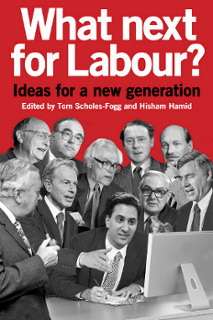What Next for Labour?
 | |
| Author | Tom Scholes-Fogg and Hisham Hamid |
|---|---|
| Country | UK |
| Language | English |
| Subject | Politics |
| Publisher | Queensferry Publishing |
Publication date | 2011 |
| ISBN | 978-1-908570-00-0 |
What Next for Labour? Ideas for a New Generation is a book released in 2011, edited by Labour blogger and activist Tom Scholes-Fogg and former Liberal Democrat supporter Hisham Hamid.[1][2] The book is an edited compilation of 29 essays written by members of the British Labour Party including Members of Parliament, peers and activists. The book seeks to present ideas from all areas of the party's political spectrum, discussing the central theme of the future of the Labour Party following the 2010 general election.[1] Topics covered include suggestions for the ideological direction of the party post–New Labour, policy ideas and broad analysis of Labour's time in government. Contributors include Peter Watt, Lord West of Spithead, Baroness Goudie, Rupa Huq, Aaron Porter, Ann Black, William Bain, Lord Temple-Morris, David Hanson, Siôn Simon, Graham Stringer, Lord Hunt of Kings Heath, Nick Palmer, Tony Lloyd, Bill Esterson, Lord Knight of Weymouth and Eric Joyce.[3] The publication is the first book by both Tom Scholes-Fogg and Hisham Hamid.
Synopsis
The central theme of the book considers the future of the Labour Party following its electoral defeat at the 2010 general election. The book is split into 8 sections, each containing essays written on a specific theme. The book covers areas including economic policy and enterprise, defence, the green agenda, crime and justice, the National Health Service, education, and the ideological future of the Labour Party.[1][4]
Introduction
The editors set out their aims and attempt to contextualize the nature of the book after 13 years of Labour government – the longest period achieved by the Labour Party since its formation in 1900. The editors highlight their intention to present a balanced debate from the left, right and centre of the party both on ideology and direction of policy as part of the party's renewal process while in opposition.
The introduction begins by highlighting the policy achievements of the Labour Party whilst in power and argues that its impact has enhanced Britain and British Society through expansion of public services and welfare and the introduction social equality legislation including the legalisation of civil partnerships. The Introduction is broadly critical of Labour’s decisions whilst in government on issues such as the War in Iraq, civil liberties, inefficient public spending initiatives and neglecting issues facing the white working classes such as: "welfare, social housing and immigration".
A generally negative view is expressed of Ed Miliband's leadership to date as it is described as "complacent" and argues "the party has failed to make any substantial progress in developing distinct policies – which is beginning to take its toll". The editors highlight what is described as a flawed strategy of simply opposing coalition spending cuts without formulating "a credible and comprehensive alternative to the coalition’s deficit reduction strategy".
An overview is given on how the Labour Party must reengage with disenfranchised voters (which includes young people and the working class), objectively evaluate the party's time in government, and become more pragmatic in policy development.[4]
Reception
The book has received positive reviews, it has attracted support within the party for the diversity of its contributors and broad range of topics covered within the book.[5] The book has been criticised for its lack of female contribution, as only 3 out of the 28 contributors are women, and failure to adequately address the European Union and Internationalism.[6]
The front cover has garnered attention for its creativity, which consists of an artificially staged photo montage of all ten former post-war Labour leaders. Criticism has also been levelled for the non-inclusion of Margaret Beckett and Harriet Harman as they were also classed as Labour leaders albeit in an interim capacity, as stated in the Labour Party constitution during leadership contests in 1994 and 2010.[6]
Scholes-Fogg received criticism in December 2011 when he was quoted in an interview for The Independent making highly critical remarks of Ed Miliband's leadership performance, and suggested he voted for the "wrong Miliband" and that Labour should now "perhaps consider a new female leader".[7][8][9]